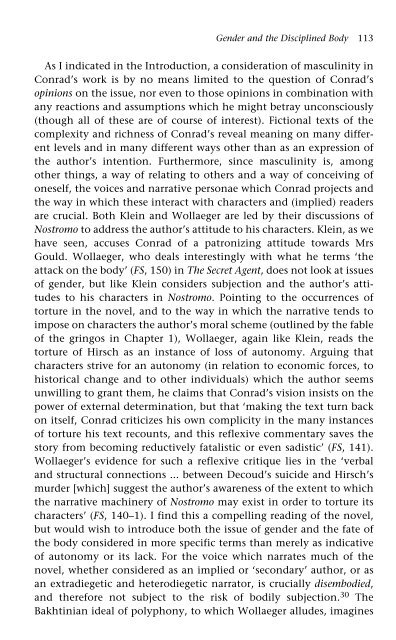Conrad and Masculinity
Conrad and Masculinity
Conrad and Masculinity
You also want an ePaper? Increase the reach of your titles
YUMPU automatically turns print PDFs into web optimized ePapers that Google loves.
Gender <strong>and</strong> the Disciplined Body 113<br />
As I indicated in the Introduction, a consideration of masculinity in<br />
<strong>Conrad</strong>’s work is by no means limited to the question of <strong>Conrad</strong>’s<br />
opinions on the issue, nor even to those opinions in combination with<br />
any reactions <strong>and</strong> assumptions which he might betray unconsciously<br />
(though all of these are of course of interest). Fictional texts of the<br />
complexity <strong>and</strong> richness of <strong>Conrad</strong>’s reveal meaning on many different<br />
levels <strong>and</strong> in many different ways other than as an expression of<br />
the author’s intention. Furthermore, since masculinity is, among<br />
other things, a way of relating to others <strong>and</strong> a way of conceiving of<br />
oneself, the voices <strong>and</strong> narrative personae which <strong>Conrad</strong> projects <strong>and</strong><br />
the way in which these interact with characters <strong>and</strong> (implied) readers<br />
are crucial. Both Klein <strong>and</strong> Wollaeger are led by their discussions of<br />
Nostromo to address the author’s attitude to his characters. Klein, as we<br />
have seen, accuses <strong>Conrad</strong> of a patronizing attitude towards Mrs<br />
Gould. Wollaeger, who deals interestingly with what he terms ‘the<br />
attack on the body’ (FS, 150) in The Secret Agent, does not look at issues<br />
of gender, but like Klein considers subjection <strong>and</strong> the author’s attitudes<br />
to his characters in Nostromo. Pointing to the occurrences of<br />
torture in the novel, <strong>and</strong> to the way in which the narrative tends to<br />
impose on characters the author’s moral scheme (outlined by the fable<br />
of the gringos in Chapter 1), Wollaeger, again like Klein, reads the<br />
torture of Hirsch as an instance of loss of autonomy. Arguing that<br />
characters strive for an autonomy (in relation to economic forces, to<br />
historical change <strong>and</strong> to other individuals) which the author seems<br />
unwilling to grant them, he claims that <strong>Conrad</strong>’s vision insists on the<br />
power of external determination, but that ‘making the text turn back<br />
on itself, <strong>Conrad</strong> criticizes his own complicity in the many instances<br />
of torture his text recounts, <strong>and</strong> this reflexive commentary saves the<br />
story from becoming reductively fatalistic or even sadistic’ (FS, 141).<br />
Wollaeger’s evidence for such a reflexive critique lies in the ‘verbal<br />
<strong>and</strong> structural connections ... between Decoud’s suicide <strong>and</strong> Hirsch’s<br />
murder [which] suggest the author’s awareness of the extent to which<br />
the narrative machinery of Nostromo may exist in order to torture its<br />
characters’ (FS, 140–1). I find this a compelling reading of the novel,<br />
but would wish to introduce both the issue of gender <strong>and</strong> the fate of<br />
the body considered in more specific terms than merely as indicative<br />
of autonomy or its lack. For the voice which narrates much of the<br />
novel, whether considered as an implied or ‘secondary’ author, or as<br />
an extradiegetic <strong>and</strong> heterodiegetic narrator, is crucially disembodied,<br />
<strong>and</strong> therefore not subject to the risk of bodily subjection. 30 The<br />
Bakhtinian ideal of polyphony, to which Wollaeger alludes, imagines




